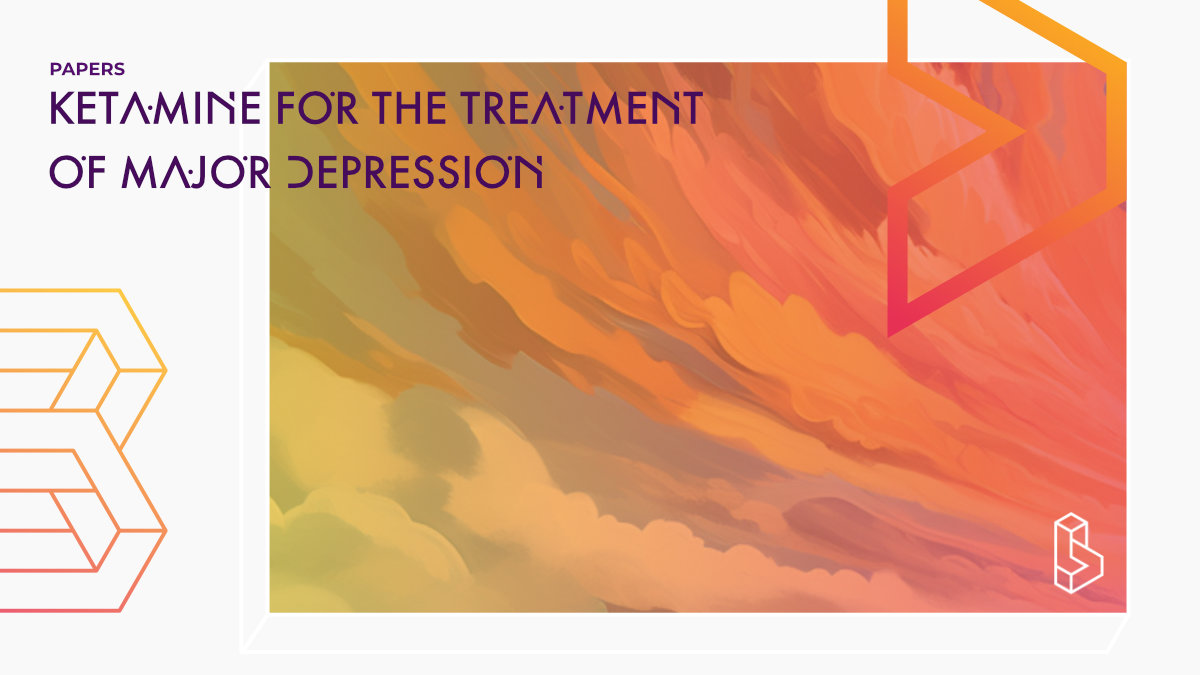This systematic review and meta-analysis (n=3299) investigated the efficacy of ketamine for depression by analysing 49 randomized controlled trials (RCTs). The study found that racemic ketamine had numerically greater effects on depression severity, response, and remission rates compared to esketamine. Higher doses were more effective than low doses, with differences evident in initial effects, ongoing treatment, and lasting effects post-final dose.
Abstract of Ketamine for the treatment of major depression
“Background Intranasal esketamine has received regulatory approvals for the treatment of depression. Recently a large trial of repeated dose racemic ketamine also demonstrated efficacy in severe depression. However, uncertainties remain regarding comparative efficacy, dosage, and the time course of response.
Methods In this systematic review and meta-analysis, we searched Embase, Medline, Pubmed, PsycINFO, and CENTRAL up to April 13, 2023, for randomised controlled trials (RCTs) investigating ketamine for depression. Two investigators independently assessed study eligibility and risk of bias and extracted the data on depression severity scores, response and remission rates, and all-cause dropouts. Multivariable mixed-effects meta-regressions incorporated drug formulation (racemic (Rac) or esketamine (Esket)) and dose (Low or High) as covariates. Treatment effects were assessed: immediately following the first dose, during further repeated dosing, and follow-up after the final dose of a treatment course. This study is registered with PROSPERO (CRD42021221157).
Findings The systematic review identified 687 articles, of which 49 RCTs were eligible for analysis, comprising 3299 participants. Standardised mean differences (95% confidence intervals) immediately following the first/single treatment were moderate-high for all conditions (Rac-High: −0.73, −0.91 to −0.56; Esket-High: −0.48, −0.75 to −0.20; Rac-Low: −0.33, −0.54 to −0.12; Esket-Low: −0.55, −0.87 to −0.24). Ongoing effects during repeated dosing were significantly greater than the control for Rac-High (−0.61; −1.02 to −0.20) and Rac-Low (−0.55, −1.09 to −0.00), but not Esket-Low (−0.15, −0.49 to 0.19) or Esket-High (−0.22, −0.54 to 0.10). At follow-up effects remained significant for racemic ketamine (−0.65; −1.23 to −0.07) but not esketamine (−0.33; −0.96 to 0.31). All-cause dropout was similar between experiment and control conditions for both formulations combined (Odds Ratio = 1.18, 0.85–1.64). Overall heterogeneity varied from 5.7% to 87.6%.
Interpretation Our findings suggested that effect sizes for depression severity, as well as response and remission rates, were numerically greater for racemic ketamine than esketamine. Higher doses were more effective than low doses. Differences were evident in initial effects, ongoing treatment, and lasting effects after the final dose.”
Authors: Stevan Nikolin, Anthony Rodgers, Andreas Schwaab, Anees Bahji, Carlos Zarate Jr., Gustavo Vazquez & Colleen Loo
Summary of Ketamine for the treatment of major depression
Ketamine, an n-methyl-D-aspartate antagonist, has emerged as a new treatment for depression, with efficacy demonstrated in severe and treatment-resistant depression. This updated meta-analysis incorporates data from the first large Phase III RCT of racemic ketamine.
Racemic ketamine and esketamine have been studied for the treatment of depression. This systematic review and meta-analysis aimed to update findings, incorporate new data from a substantive trial of racemic ketamine, evaluate outcomes over the treatment course and at follow-up, and examine the effect of the dosing approach.
Find this paper
Ketamine for the treatment of major depression: a systematic review and meta-analysis
https://doi.org/10.1016/j.eclinm.2023.102127
Open Access | Google Scholar | Backup | 🕊
Cite this paper (APA)
Nikolin, S., Rodgers, A., Schwaab, A., Bahji, A., Zarate, C., Vazquez, G., & Loo, C. (2023). Ketamine for the treatment of major depression: a systematic review and meta-analysis. eClinicalMedicine, 62.
Study details
Compounds studied
Ketamine
Topics studied
Depression
Study characteristics
Meta-Analysis
Literature Review
Participants
3299
Humans

